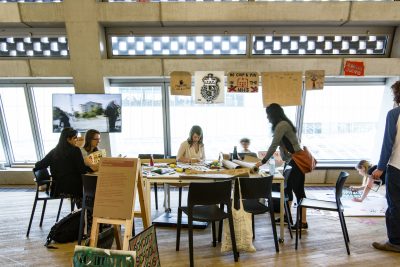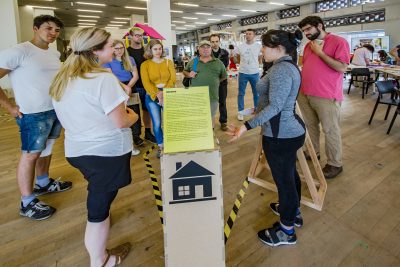This event welcomed contributions from the audience. Audience members were also invited to join panellists and speakers during the breaks for Fika (coffee and conversation)
PROGRAMME
12-12.15
Introduction: Hostile Environments: The politics of (Un)Belonging
Introduction and welcome Umut Erel and Victoria Canning (The Open University)
12.15-12.45
Lost in Lebanon: The human cost of hostile environments beyond Europe.
Lost in Lebanon (Scott sisters, 2017) documents the experiences of 4 of the 1.5 million Syrians who find
themselves in legal limbo in Lebanon. This event combines film clips with a discussion on the impacts of
increasingly hostile policies beyond the borders of Europe, hosted by Gabi Kent (The Open University) in
conversation with Syrian activist, Leila Sibai (SOAS)
12.45-1.30
Migration and Asylum Justice Forum: Life in Britain’s Hostile Environment Chaired by Tom Vickers
Many people make long migratory journeys to host countries in Europe, often with the expectation that
previous struggles will be over. However, an increasingly hostile approach to immigration means that
the process of seeking asylum can become an extended struggle. Poor housing, destitution, the threat
of detention, and reductions in welfare and healthcare often cause people further harms.
This panel comprises members of the Migration and Asylum Justice Forum, who will each outline the
problems arising from hostility, with discussions led by experts by experience
1.30-2.15pm
Addressing the politics of exclusion: Chaired by Umut Erel
The hostile environment has become front page news, but it existed long before Theresa May’s
inclusion of the term during a speech in 2014. This panel draws together activists and academics to
highlight how exclusionary politics has come to be the norm, and how we encourage others to engage
in an alternative vision of solidarity and community building.
Speakers include: Monish Bhatia (Birkbeck University), Sandhya Sharma (Safety 4 Sisters) and Rachel
Humphris (IRIS, Birmingham University).
2.15-2.30: BREAK
2.30-3.30pm
Panel: Gendered Harms in a Hostile Environment Chaired by Monish Bhatia
The impacts of border controls are not gender neutral. Survivors of gendered and sexual violence or
persecution can face multiple further barriers to gaining support, and governmental policies can lead to
further problems if and when women cannot access domestic violence refuges or support in the
aftermath of sexual violence.
This panel draws out findings from multiple projects based in the UK and Europe. Speakers include:
Victoria Canning (The Open University), Umut Erel (The Open University), Abi Brunswick (Project 17)
Discussant 3.30-4pm Nira Yuval Davis (Centre on Migration, Refugees and Belonging, University of East
London)
3.30-3.45 BREAK
3.45-5pm
Resisting Hostility, Building Collectivity. Chaired by Victoria Canning
The hostile environment can no longer be denied or ignored. How are migrant advocacy groups building
movements to support affected people and ensure the safety and wellbeing of people arriving in host
countries in the future?
This panel brings together activist groups working across the UK and Northern Europe. Panellists
include: Migrant Artists Mutual Aid (UK), Cihan Arikan (RFSL, LGBTQ support, Sweden), Marina
Vilhelmsson (Photographer, ‘Queering Refugee Resistance’, Sweden), John Speyer (Music in Detention).
This panel also includes readings from Migrant Artists Mutual Aid’s new book ‘Strategies for Survival,
Recipes for Resistance’, with the opportunity to buy a copy at the end of the session. All proceeds to go
MaMa’s Legal Fund. Marina’s photography will be available to view throughout the day.
5-6pm
Discussion, Network Building and Planning for the Future


